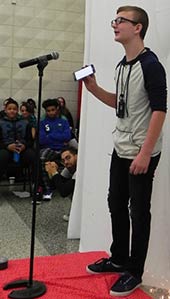Katie Mitchell could have picked from a range of interesting topics to share with classmates, but she choose the one closest to her heart.
The Crossroads Middle School eighth-grader picked tragedy.
As part of a spoken-word poetry workshop held at the school, Katie’s topic included how to forge ahead following the deaths of two uncles and an aunt due to strokes in the last several months. She wrote about family and overcoming pain and learning that life goes on.
“It was really hard,”said Katie, a member of the school’s language arts class who read their works before an enthusiastic assembly of their peers. “But it just came. There were some tears, but I got through it.”

That describes many of the nearly two dozen students who were part of a three-day workshop conducted by The Diatribe, a spoken-word poetry group that works in schools to encourage student awareness and self-expression.
The Crossroads students were first asked to pick two topics, work in small groups to hone their work, and then present it to classmates during an assembly. The workshop aimed to not only help students tackle a new type of writing, but also learn to share tough topics before their peers. Topics students wrote about included bullying, homosexuality, politics, masking feelings, family, love and loss, and conflictwith parents.
By writing about their deepest fears and concerns, the students learn empowerment, said The Diatribe’s Rachel Gleason, a poet and musician whose work often ties together religious symbolism with vivid imagery and wordplay.
‘I think the writing can help them heal, bring them closer together.’
— Kathy Vogel, English teacher
“You combine live arts and performance,” Gleason said of the students’ poetry. “Kids need a safe space and this is one way for them to gain power – talking to other students. They empower themselves by talking about these things.”
Sharing Trials Through Poetry
Started in 2013, The Diatribe currently works with only a handful of schools, but hopes to increase that number to between 20 and 30 schools by spring.
Gleason said middle school students are the ideal age for the project. They’ve lived long enough to recognize life’s challenging path, but haven’t yet shut down in terms of expressing feelings like many older students, she said.

“More (middle schoolers) are willing to open up,” she said. “High school kids can be more withdrawn, a wall is put up. What we try to do isn’t just about writing, it’s other learning to support one another. It’s breaking through to talk about things you don’t normally talk about.”
Crossroads English teacher Kathy Vogel said mastering spoken-word poetry benefits students’ writing skills, but also teaches them that their peers are experiencing the same tribulations they deal with.
“I think the writing can help them heal, bring them closer together,” Vogel said. “But most importantly it shows them that their voice can matter. Words can be said in a powerful way.”
Language arts teacher Benson Mitchell said the ability of students to grasp the significance of developing their own voice — both in writing and in presenting their work — is critical.
“Middle school is a transitional stage, so you are busy trying to develop your own voice,” Mitchell said. “I think students learn that they are all the same, but that they’re not alone.”
CONNECT
Poetry Groups Inspires Students to Mix Words, Share Experience









